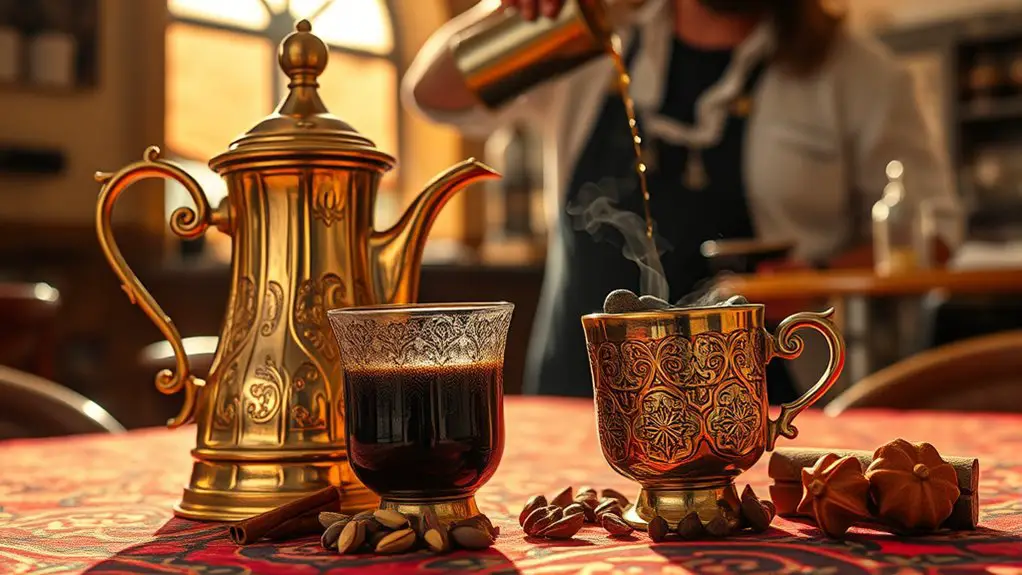Middle Eastern coffee culture greatly influences brewing methods worldwide. You'll notice how finely ground coffee is simmered in traditional pots, allowing the aroma to create an inviting atmosphere. Spices like cardamom and cinnamon add warmth and depth to flavors, making each cup a sensory delight. Serving coffee becomes an act of hospitality, inviting connection and stories. As you explore, you'll find that these age-old practices shape modern coffee experiences, revealing even more layers of tradition and influence.
The Historical Roots of Coffee in the Middle East
As you explore the rich tapestry of Middle Eastern coffee culture, you'll discover its origins weaving back to the 15th century, when coffee first emerged in the bustling markets of Yemen. Here, the aroma of roasted beans filled the air as traders engaged in ancient trade, exchanging not just goods but stories and ideas. This vibrant exchange laid the groundwork for coffee to travel across borders, reaching the Ottoman Empire and beyond. Each cup served embodies centuries of cultural exchange, reflecting the diverse influences of the region. You can almost hear the laughter and debate that once filled coffeehouses, spaces where ideas flowed as freely as the brew itself. It's a reflection of coffee's role in fostering connections and celebrating freedom throughout history.
Traditional Brewing Techniques: The Art of Arabic Coffee
While exploring the intricate world of Arabic coffee, you'll find that its brewing techniques are steeped in tradition and artistry. The process often begins with finely ground coffee, gently simmered in a special pot called a dallah. This isn't just a task; it's a cherished ritual. As the rich aroma fills the air, you witness a dance of patience and respect, reminiscent of ancient customs. The coffee is poured into small cups, each sip inviting you to appreciate its nuances. Enjoying Arabic coffee transcends mere consumption; it's about connection, conversation, and community. These brewing rituals embody the spirit of hospitality, where every cup brewed is a representation of the art of Arabic coffee and the bonds it fosters among people.
The Role of Spices and Flavorings in Middle Eastern Coffee
When you explore Middle Eastern coffee, you'll quickly discover that spices and flavorings play an essential role in enhancing its rich profile. Each cup is a fragrant journey, often infused with spice blends like cardamom, cinnamon, and cloves. These additions don't just elevate the drink; they create a tapestry of flavor profiles that evoke the warmth of gatherings and the vibrancy of the region's culture. Imagine sipping a steaming cup where the warmth of cardamom dances on your palate, harmonizing with the boldness of the coffee. This intricate layering transforms a simple brew into an experience, inviting you to savor the moment. With each sip, you embrace the freedom of exploration, discovering new dimensions of taste that resonate deeply within you.
Social Rituals: Coffee as a Symbol of Hospitality
In many Middle Eastern cultures, coffee isn't just a drink; it's a heartfelt gesture of hospitality. When you step into a home, you're often greeted with the rich aroma of brewing coffee, signaling an invitation to share stories and laughter. Coffee ceremonies unfold like a dance, with the host carefully preparing the brew, showcasing their hospitality customs. Each pour is intentional, a sign of respect and friendship. As you sip the dark, spiced liquid, you feel the warmth of connection, transcending mere refreshment. In this sacred ritual, coffee becomes more than a beverage; it symbolizes welcome and community, forging bonds that linger long after the last drop is served. Here, coffee is a bridge, uniting hearts and minds in joyous celebration.
Global Influence: How Middle Eastern Practices Shape Modern Brewing Trends
As the world embraces diverse coffee experiences, Middle Eastern brewing traditions are leaving an indelible mark on modern coffee culture. You'll find that cultural exchange is thriving as baristas worldwide adopt techniques that highlight the rich flavors and aromas of Arabic coffee.
- The use of spices like cardamom and cloves in brewing
- The rise of Turkish coffee in specialty cafes
- Community-focused coffee rituals that encourage connection
- Traditional serving methods, like using a dallah or cezve
- Modern adaptations, such as cold brew infused with Middle Eastern flavors
These elements not only celebrate heritage but also inspire creativity, inviting everyone to enjoy a unique coffee journey that's all about freedom and exploration.
Frequently Asked Questions
What Are the Health Benefits of Drinking Middle Eastern Coffee?
While the rich aroma of Middle Eastern coffee beckons, it's not just a treat; it's packed with antioxidant properties and a balanced caffeine content, giving you energy and promoting heart health. Enjoy every sip!
How Does the Grind Size Affect Brewing Methods in Middle Eastern Coffee?
The grind size dramatically affects your coffee's extraction; finer grinds yield richer flavors at lower brewing temperatures. With consistent grind, you'll experience a delightful balance, elevating your coffee ritual to a liberating sensory experience.
Can Middle Eastern Coffee Be Brewed Using Modern Coffee Machines?
You might wonder if modern coffee machines can capture that rich, traditional essence. While they can adapt various brewing techniques, the true magic lies in the art of handcrafting, where passion meets patience, creating unforgettable experiences.
What Types of Beans Are Commonly Used in Middle Eastern Coffee?
When exploring Middle Eastern coffee, you'll often find Arabica varieties prized for their sweetness, alongside robust Robusta profiles that add depth. The rich flavors invite you to savor each sip, embracing a vibrant coffee tradition.
How Does Middle Eastern Coffee Culture Differ Between Countries?
You'll notice cultural variations in Middle Eastern coffee, from the rich, spiced brews of Turkey to the strong, dark flavors of Saudi Arabia. Each country's regional preferences shape unique traditions, inviting you to explore their diverse worlds.
